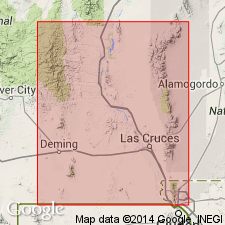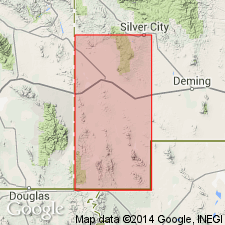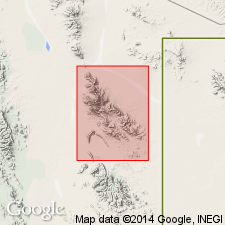
- Usage in publication:
-
- Cutter formation
- Modifications:
-
- Named
- Dominant lithology:
-
- Limestone
- Dolomite
- Claystone
- AAPG geologic province:
-
- Orogrande basin
Summary:
Named as top formation (of four) of Montoya group; type locality opposite the Sierrite Mine at head of Cable Canyon, NW1/4 sec 10, T16S, R4W, Caballo Mountains, Sierra Co, NM in Orogrande basin. Section measured. Occurs throughout Caballo Mountains area, especially in west-facing escarpments, except where it has been removed in part or entirely by pre-Pennsylvanian erosion, as at southeast end of Nakaye Mountain. In many exposures it is a steep slope overlain by the dark-weathering Fusselman formation ledge. Throughout most of Caballo Mountains formation consists entirely of bedded dolomitic limestone and dolomite, but in Mud Springs Mountains, the lower fourth of the formation consists of claystone and limestone which rests disconformably on the cherty beds of underlying Aleman formation (new). At some places there is a thin limestone breccia bed at base. Is 0-162 ft thick. The limestone is medium gray to dark gray on fresh surfaces; the dolomite is light gray to dark gray. Limestone weathers blue gray; dolomite and calcitic dolomite weather light gray or light tan. Only a few of the dolomite beds are very finely crystalline. Both limestone and dolomite are sublithographic in texture. Occasional chert bands or rounded nodules present. Upper 50-75 ft of formation is vertically jointed and contains geodal concretions. Fossils scarce. Is of Cincinnatian, Late Ordovician age. Upper part of formation may be Silurian.
Source: GNU records (USGS DDS-6; Denver GNULEX).

- Usage in publication:
-
- Cutter Member
- Modifications:
-
- Areal extent
- Overview
- AAPG geologic province:
-
- Pedregosa basin
Summary:
Is the upper member of the Montoya Dolomite. Was studied in detail only in Mescal Canyon, where a section 237 ft thick was measured and described. Section is in NE1/4 SE1/4 sec 29, T30S, R15W, Hidalgo Co, NM, Pedregosa basin. Overlies Aleman Member of Montoya. Unconformably underlies Percha Shale. Is rich in brachiopods and shell debris. Assigned to the Cincinnatian Series of the Ordovician.
Source: GNU records (USGS DDS-6; Denver GNULEX).

- Usage in publication:
-
- Cutter Dolomite*
- Modifications:
-
- Mapped 1:24k
- Dominant lithology:
-
- Dolomite
- AAPG geologic province:
-
- Pedregosa basin
Summary:
Cutter Dolomite, uppermost formation of Montoya Group. Mapped in Big Hatchet Mountains, Hidalgo County, southwestern New Mexico. Medium-gray, fine-grained, uniformly medium-bedded, slightly cherty dolomite that weathers light gray. Thickness about 237 feet (70 m). Disconformably underlies Percha Shale (Upper Devonian). Overlies Aleman Dolomite (Upper Ordovician) of Montoya Group. Fossiliferous (brachiopod fragments, worm-borings). Age is Late Ordovician.
Source: Publication.
For more information, please contact Nancy Stamm, Geologic Names Committee Secretary.
Asterisk (*) indicates published by U.S. Geological Survey authors.
"No current usage" (†) implies that a name has been abandoned or has fallen into disuse. Former usage and, if known, replacement name given in parentheses ( ).
Slash (/) indicates name conflicts with nomenclatural guidelines (CSN, 1933; ACSN, 1961, 1970; NACSN, 1983, 2005, 2021). May be explained within brackets ([ ]).

